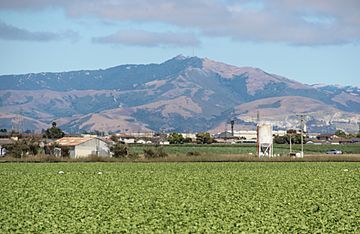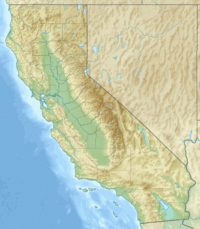Fremont Peak (California) facts for kids
Quick facts for kids Fremont Peak |
|
|---|---|

Fremont Peak viewed from California State Route 1
|
|
| Highest point | |
| Elevation | 3,173 ft (967 m) NAVD 88 |
| Naming | |
| Etymology | John C. Frémont |
| Geography | |
| Parent range | Gabilan Range |
| Topo map | USGS San Juan Bautista |
| Reference #: | 181 |
Fremont Peak is a tall mountain in California. It's part of the Gabilan Range, a chain of mountains along California's central coast. From the top, you can see amazing views! You'll spot the Salinas Valley, Monterey Bay, and other mountain ranges nearby. This peak is about 11 miles northeast of Salinas, California.
Fremont Peak is home to Fremont Peak State Park. This park was created in 1936 and covers 188 acres. It has places for camping and picnics. Many astronomers love this park because the night sky is very clear, with little light pollution. The Fremont Peak Observatory has a large 30-inch telescope. It was built by Kevin Medlock in the early 1980s.
History of Fremont Peak
This mountain was once called Gavilan Peak. It is now named after John C. Frémont. He was an American explorer and a Captain in the U.S. Army Corps of Topographical Engineers.
Frémont's Visit in 1846
In 1846, Captain Frémont and about 60 armed surveyors came to the peak. They wanted to see how important the peak was for military purposes. The peak overlooks the path to Monterey.
A local Mexican leader, General José Castro, told Frémont and his men to leave California. But Frémont did not obey. He built a small fort and raised a modified American flag on the peak. Some say the flag was on a lower peak nearby.
The U.S. Consul in Monterey, Thomas O. Larkin, agreed with General Castro. So, Frémont and his men were told to leave the area. A very windy night blew down their flagpole. Frémont used this as an excuse to quickly leave the peak with his men. Today, Fremont Peak is a California Historical Landmark #181.
Celebrating Fremont Peak
On March 4, 1906, local people started "Frémont Peak Day" after a trip to the summit. Nineteen years later, a group called the Native Sons of the Golden West placed a special plaque on the summit to remember the history.
 | Tommie Smith |
 | Simone Manuel |
 | Shani Davis |
 | Simone Biles |
 | Alice Coachman |



